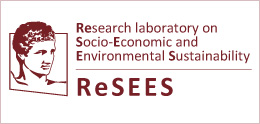Joint implementation of the Agenda 2030 and the European Green Deal: Transformations for a sustainable recovery from COVID-19 | Feb. 2nd
On the occasion of the 2022 UN-ECOSOC Partnership Forum, to be held on 2 February 2022, SDSN Europe and SDSN Greece co-organize a side event: Joint implementation of the Agenda 2030 and the European Green Deal: Transformations for a sustainable recovery from COVID-19.
The European Green Deal, introduced in December 2019 by the European Commission, aims to make Europe climate-neutral, resource-efficient, innovative, and socially inclusive. Therefore, the European Leadership has committed to including both in the European Semester, the alignment process of Member States’ budget and economic policy with the rules agreed at the EU level, and in the Strategic guidelines on various Policy areas, the 17 Sustainable Development Goals (SDGs) of the UN Agenda 2030, a globally accepted pledge for poverty eradication and sustainable development, which considers three pillars– economic, social, and environmental. Moreover, the EU has responded to the pandemic’s consequences on health, environment, and economy with a generous “Next Generation EU” package of funds and mobilizing policies, to support the economic recovery, while pursuing Europe’s green and digital transition.
This is a pre-launch of the 2022 SDSN Europe Report on the Transformations for the Joint Implementation of EGD and the SDGs.
You can find our 2021 report here.
Information about the Senior Working Group that leads the report, here.


Throughout this session, the participants will examine how the joint implementation of the 17 Sustainable Development Goals of the UN Agenda 2030 and the European Green Deal could promote the recovery from the COVID-19 consequences, sustainably.
Prof. Phoebe Koundouri (Discussion Lead)
will provide an overview of the advancements regarding the Sustainability Policy Framework, with a focus on the Policy and Strategy documents published during the last two years stemming from the European Green Deal. Moreover, she will share the results of a recently developed methodology for mapping the Policies of the European Green Deal to the 17 SDGs, using Machine Learning techniques.
Dr Carlo Papa will share his views on the effects that the Green and Digital Transition have on job multipliers and Employment in Europe, especially in the energy sector. The transformation of the Energy sector is undoubtedly essential for the transition to a sustainable economic model and the net-zero emissions target. This means that it will cause structural changes in employment in the energy sector and the reskilling of employees. In addition to the thousands of new jobs in renewables, will also benefit the employment rates in other segment of the complex energy value chain from mining to software to enhance consumer benefits.
Mr Ketan Patel will talk about the Sustainability of global Assets under Management, directed to finance the Green Recovery. Also, he will give an overview of the gap identified in the funding of the SDGs implementation and provide suggestions for closing it, recognizing the need for coordination between governments, individuals, and private corporations beyond traditional financial services companies, for funding sustainable development and a transition to the future.
Prof. Theodoros Zachariadis will provide an overview of how effective the European Countries are in incorporating the SDGs in their National Recovery and Resilience Plans (RRPs). For a sample of seven EU Member States, he will present some results on the relevance of their recovery investments and reforms to specific SDGs, and how the recovery funds of these EU Member states are allocated to different SDGs.
Mrs Ilenia Romani, will present a recent work by Fondazione Eni Enrico Mattei aimed at assessing the impact of the Italian RRP’s interventions on the energy consumption and on the CO2 emissions of the country, carried out by using the GEM model by Oxford Economics to build a number of scenarios and generate relevant simulations. The work will also demonstrate the validity of the simulations of the macroeconomic impact obtained with the same model and compared to those carried out by other institutions.
Watch the session here




 Πατησίων 76
Πατησίων 76 30 2108203 455
30 2108203 455
